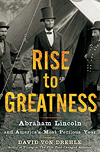
Rise to Greatness: Abraham Lincoln and America’s Most Perilous Year, by David Von Drehle, Henry Holt and Co., New York, 2012, $30
Beginning this fine history, journalist von Drehle (Triangle: The Fire That Changed America) points out that in early 1862, six months after the First Battle of Bull Run (or Manassas), many loyal Northerners considered President Abraham Lincoln incompetent. By year’s end few had changed their minds.
The Confederate army threatened Washington, D.C. Commanding the Army of the Potomac in July 1861, Maj. Gen. George McClellan, who despised Lincoln and had no great objection to slavery or the Confederacy, marched and trained his men but brushed off repeated suggestions he attack.
Raising money for a crushingly expensive war seemed impossible. The British and French governments favored the Confederacy and seemed inclined to intervene. Many Northerners considered Lincoln a dangerous radical for trampling states’ rights, but abolitionists (still a minority) denounced him as a weakling for refusing to advocate emancipation for fear of offending the four border slave states that remained in the Union.
Thrilling news arrived in February 1862 when the still obscure Brig. Gen. Ulysses S. Grant won spectacular victories at Forts Henry and Donelson in the Western theater, and again in March when Admiral David Farragut led Union forces to capture New Orleans. Lincoln cheered up even more when McClellan finally led his army into action, moving by sea to the east coast of Virginia. Sadly, his unhurried advance stalled in the face of an aggressive enemy, and after a few bloody months he retreated without having lost any battles. Shiloh in April raised no one’s spirits. The outlook declined further that summer when McClellan delayed reinforcing a rival, resulting in defeat at Second Bull Run/Manassas. McClellan’s deliberation during the massive slaughter at Antietam thwarted a decisive victory, though as enemy forces withdrew afterward, Lincoln proclaimed it a success and used it to justify issuing his preliminary Emancipation Proclamation. He also decided to exert closer control over his generals and fired McClellan. His replacement, Maj. Gen. Ambrose Burnside, led the army to disaster at Fredericksburg in December, so 1862 ended on a low note. Matters did not improve during the first half of 1863, but better things were in store.
This intelligent account reminds readers that the Civil War was well under way before people thought Lincoln was a man for the ages. Few thought so in 1862.
—Mike Oppenheim




